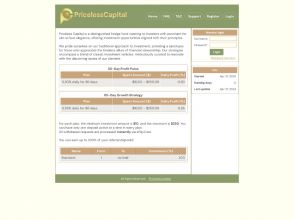
Identifying online investment scams - tips for protecting your money
 In the digital age, online investment opportunities have become both a boon and a bane.
In the digital age, online investment opportunities have become both a boon and a bane. While the internet offers a plethora of legitimate investment options, it also provides a breeding ground for scammers looking to exploit unsuspecting investors.
Identifying online investment scams is crucial for safeguarding your hard-earned money.
In this information-style article, we will explore key tips to help you distinguish between legitimate opportunities and potential scams.
Identifying online investment scams: tips for protecting your money
🔸 1. Research and Due Diligence:
One of the fundamental steps in protecting your money from online investment scams is conducting thorough research. Legitimate investment opportunities are backed by transparent and verifiable information. Utilize reliable financial news sources, check the credibility of the platform, and scrutinize the historical performance of investments.
Interesting Fact: According to a report by the Federal Trade Commission (FTC), the median loss due to investment scams in 2021 was $3,000, highlighting the financial impact on unsuspecting victims.
🔸 2. Watch Out for Unrealistic Returns:
Scammers often lure potential investors with promises of extraordinarily high returns in a short period. If an investment opportunity seems too good to be true, it probably is. Legitimate investments come with inherent risks, and realistic returns are commensurate with these risks.
Interesting Fact: The North American Securities Administrators Association (NASAA) reported that over 80% of investment fraud cases involved promises of high returns with little or no risk.
🔸 3. Verify Regulatory Compliance:
Reputable investment platforms comply with financial regulations and are registered with relevant authorities. Before committing your funds, verify the legitimacy of the platform by checking regulatory registrations. Additionally, ensure that the investment opportunity aligns with your financial goals and risk tolerance.
Interesting Fact: The Securities and Exchange Commission (SEC) provides an online tool called EDGAR (Electronic Data Gathering, Analysis, and Retrieval) that allows investors to access and verify financial documents filed by companies.
🔸 4. Be Skeptical of Pressure Tactics:
Scammers often use high-pressure tactics to push investors into making hasty decisions. Be wary of anyone who insists on an immediate decision or claims that the opportunity is available for a limited time only. Legitimate investments allow investors to take the time they need to make informed decisions.
Interesting Fact: A common tactic employed by scammers is to create a sense of urgency, manipulating investors into bypassing due diligence. According to the Better Business Bureau (BBB), this urgency is a red flag for potential scams.
🔸 5. Stay Informed About Common Scams:
Educate yourself about common online investment scams to stay one step ahead of fraudsters. Ponzi schemes, pump-and-dump schemes, and fake initial coin offerings (ICOs) are prevalent in the digital investment space. Being aware of these tactics can help you identify warning signs and protect your finances.
Interesting Fact: The Internet Crime Complaint Center (IC3) reported a significant increase in investment-related scams in recent years, with losses exceeding billions of dollars annually.
🔸 6. Utilize Secure and Reputable Platforms:
Choose investment platforms that prioritize security and have a proven track record. Reputable platforms use encryption to safeguard your personal and financial information. Check for secure website connections (https://) and reviews from other investors. Additionally, be cautious about clicking on unsolicited links or responding to emails promoting investment opportunities.
Interesting Fact: The Association of Certified Fraud Examiners (ACFE) reports that scammers often create fake investment websites that mimic legitimate platforms, making it essential to verify the authenticity of the site before making any financial commitments.
🔸 7. Monitor for Red Flags in Communication:
Scammers frequently use unsolicited communication methods, such as cold calls or unsolicited emails, to pitch investment opportunities. Be wary of individuals who contact you out of the blue, especially if they pressure you to invest quickly. Legitimate investment opportunities allow investors to initiate contact and conduct due diligence at their own pace.
Interesting Fact: The U.S. Commodity Futures Trading Commission (CFTC) emphasizes the importance of verifying the credentials of individuals offering investment advice or opportunities, as fraudulent actors often pose as financial professionals.
🔸 8. Be Wary of Cryptocurrency Scams:
The rise of cryptocurrencies has brought about a new wave of scams. Be cautious of schemes promising guaranteed returns through cryptocurrency investments. Verify the legitimacy of the cryptocurrency and the platform offering it. The decentralized and relatively anonymous nature of cryptocurrencies makes them an attractive target for scammers.
Interesting Fact: The Federal Bureau of Investigation (FBI) notes an increase in cryptocurrency-related scams, including fake ICOs, pump-and-dump schemes, and ransomware attacks, making it crucial for investors to exercise caution in the crypto space.
🔸 9. Report Suspected Scams:
If you come across a potential online investment scam or have fallen victim to one, report it to the appropriate authorities. Agencies such as the FTC, SEC, and your local law enforcement can investigate and take action against fraudulent actors. Reporting scams not only protects you but also helps prevent others from becoming victims.
Interesting Fact: The FBI's Internet Crime Complaint Center (IC3) received over 800,000 complaints in 2021, with reported losses exceeding $6 billion, highlighting the prevalence of online scams and the importance of reporting.
Summary
As technology continues to advance, online investment scams evolve and become more sophisticated. Protecting your money requires a proactive approach, involving research, skepticism, and vigilance.
By staying informed about common scams, choosing secure platforms, and reporting suspicious activities, you contribute to a safer digital investment landscape. Remember, the best defense against online investment scams is a well-informed and cautious investor.
Other News

Add a review











 Unraveling the Nexus - Symbiosis between Markets + Cryptocurrency
Unraveling the Nexus - Symbiosis between Markets + Cryptocurrency The rise of robo-advisors - how auto investing is changing the game
The rise of robo-advisors - how auto investing is changing the game How to assess the credibility - and track record of a HYIP program
How to assess the credibility - and track record of a HYIP program Realistic goals - setting realistic goals for online investments
Realistic goals - setting realistic goals for online investments Withdrawal Process - unveiling the withdrawal process in HYIP monitor
Withdrawal Process - unveiling the withdrawal process in HYIP monitor









